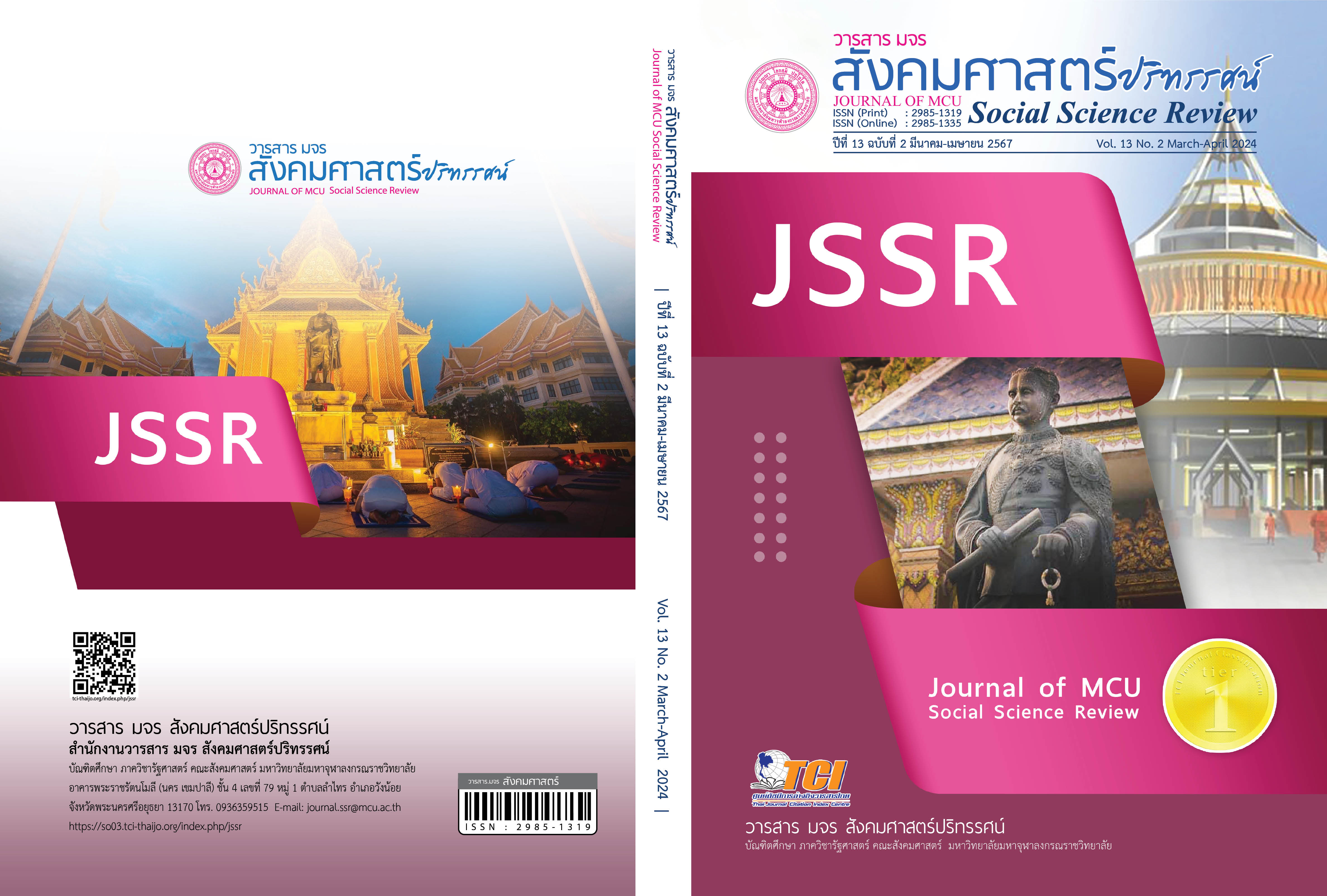การพัฒนาโปรแกรมการศึกษานอกระบบโรงเรียนเพื่อเสริมสร้างสุขภาวะ ของแรงงานต่างด้าว
คำสำคัญ:
สุขภาวะ, แรงงานต่างด้าว, การพัฒนาโปรแกรมการศึกษานอกระบบโรงเรียนบทคัดย่อ
บทความวิจัยนี้มีวัตถุประสงค์ 1. ศึกษาความต้องการในการเรียนรู้เพื่อเสริมสร้างสุขภาวะของแรงงานต่างด้าว 2. พัฒนาโปรแกรมการศึกษานอกระบบโรงเรียนเพื่อเสริมสร้างสุขภาวะของแรงงานต่างด้าว ด้วยการวิจัยเชิงปริมาณ ดำเนินการทดลองแบบกลุ่มเดียว วัดผลก่อนและหลังทดลอง มีลำดับขั้น 2 ระยะ คือ ระยะที่ 1 วางแผนพัฒนาโปรแกรมด้วยการวิเคราะห์สภาพความต้องการ กลุ่มตัวอย่างที่ใช้ ได้แก่ แรงงานต่างด้าวสัญชาติพม่า ที่อยู่ในสถานประกอบการอุตสาหกรรม 560 คน สุ่มตัวอย่างแบบเฉพาะเจาะจง เครื่องมือที่ใช้ คือ แบบสอบถามความต้องการ ระยะที่ 2 ออกแบบโปรแกรมเสริมสร้างสุขภาวะและการนำไปใช้ กลุ่มตัวอย่างที่ใช้ ได้แก่ แรงงานต่างด้าวสัญชาติพม่าที่สื่อสารภาษาไทยได้ และสมัครใจเข้าร่วม 30 คน เครื่องมือที่ใช้ในการเก็บรวบรวมข้อมูล คือ แบบวัดความรู้ แบบประเมินทัศนคติ และทักษะ ผลการศึกษาความต้องการในการเรียนรู้เพื่อเสริมสร้างสุขภาวะของแรงงานต่างด้าว วิเคราะห์จากแบบสอบถาม จำนวน 560 คน
ผลการวิจัยพบว่า แรงงานต่างด้าวมีความต้องการการเสริมสร้างสุขภาวะทางกายมากที่สุด และการพัฒนาโปรแกรมการศึกษานอกระบบโรงเรียนเพื่อเสริมสร้างสุขภาวะของแรงงานต่างด้าว พบว่า โปรแกรมได้เสริมสร้างสุขภาวะแรงงานต่างด้าว ผลจากหลังการเข้าร่วมกิจกรรมแรงงานต่างด้าวมีความรู้ ทัศนคติ และทักษะเกี่ยวกับสุขภาวะเพิ่มมากขึ้น
เอกสารอ้างอิง
กรมการจัดหางาน. (2563). ภาวการณ์ทำงานของประชากรสถานการณ์ตลาดแรงงานปี พ.ศ. 2562. กรุงเทพฯ: กรมการจัดหางาน.
บุญชม ศรีสะอาด. (2545). การวิจัยเบื้องต้น. กรุงเทพฯ: สุวีริยาสาส์น.
ประเวศ วะสี. (2550). สุขภาวะที่สมบูรณ์. กรุงเทพฯ: สำนักพิมพ์หมอชาวบ้าน.
พิมพันธ์ เตชะคุปต์. (2546). การสอนคิดด้วยโครงงาน. กรุงเทพฯ: จุฬาลงกรณ์มหาวิทยาลัย.
วิจารณ์ พานิช. (2554). การจัดการเรียนรู้สำหรับศตวรรษที่ 21. กรุงเทพฯ: โรงแรมมิราเคิลแกรนด์คอนเวนชั่น.
ศิริชัย กาญจนวาสี. (2544). การเลือกใช้สถิติที่เหมาะสมสำหรับการวิจัย (พิมพ์ครั้งที่ 4). กรุงเทพฯ: บุญศิริการพิมพ์.
สมชาติ กิจยรรยง และอรจรีย์ ณ ตะกั่วทุ่ง. (2552). เทคนิคการจัดฝึกอบรมเพื่อพัฒนาบุคลากรอย่างมีประสิทธิภาพ. กรุงเทพฯ: สมาคมส่งเสริมเทคโนโลยี (ไทย-ญี่ปุ่น).
สมบัติ ท้ายเรือคำ. (2551). ระเบียบวิธีวิจัยสำหรับมนุษยศาสตร์และสังคมศาสตร์. กาฬสินธุ์: ประสานการพิมพ์.
สำนักงานคณะกรรมการการศึกษาแห่งชาติ. (2545). พระราชบัญญัติการศึกษาแห่งชาติ พ.ศ. 2542. กรุงเทพฯ: สกายบุ๊คส์.
สุรพล ไกรสราวุฒิ. (2552). คู่มือปัญญาในพระพุทธศาสนา. กรุงเทพฯ: ธรรมสถานจุฬาลงกรณ์มหาวิทยาลัย.
อาชัญญา รัตนอุบล. (2551). การเรียนรู้ละพัฒนาการของผู้ใหญ่. กรุงเทพฯ: จุฬาลงกรณ์มหาวิทยาลัย.
Bellanca, J. & Brandt, R. (2010). 21st century skills: Rethinking how students learn. Bloomington, IN: Solution Tree Press.
Boyle, P.G. (1981). Planning Better Programs. New York: Mc Graw Hill Book Company.
Bloom, B. S. (1956). Taxonomy of educational objectives: the classification of educational goals; Handbook I: Cognitive domain. New York: David McKay.
Burton, J. (2010). WHO Healthy Workplace Framework and Model: Background and Supporting literature and Practices. Retrieved March 20, 2022, from https://shorturl.asia/CHQ9K
Capra, F. (1997). The Web of Life. London: Flamingo.
Caffarella, R.S. (1994). Planning Programs for Adult Learner. San Francisco: Jossey Bass Publishers.
Cranton, M. (2002). Self-Directed Learning: A guide for learners and teachers. Chicago: Association Press and Follett Publishing.
Ratana–Ubol, A. & Charungkairirikul. (2009). The article in non-formal and informal education day in 2011. Bangkok: Chulalongkorn University.
Dirkx, J. M. (1998). The transformative dimensions of global learning experiences: An overview. Retrieved March 20, 2022, from https://shorturl.asia/93bKx
Ingalls, J.D. (1973). A trainer’s guide to Andragogy. Washington: U.S. Department of Health, Education and Welfare, Social and Rehabilitation Service.
Knowles, M. (1980). The modern practice of adult education: From pedagogy to andragogy. Chicago: Follett.
Taylor, M. C. (2007). The need for self-esteem. In H. Yusa & M. B. Walse (Eds.), Human Needs 2 and the Nursing Process. (pp.117-153). Norwalk: Appleton Century-Crofts.
ดาวน์โหลด
เผยแพร่แล้ว
รูปแบบการอ้างอิง
ฉบับ
ประเภทบทความ
สัญญาอนุญาต
ลิขสิทธิ์ (c) 2024 วารสาร มจร สังคมศาสตร์ปริทรรศน์

อนุญาตภายใต้เงื่อนไข Creative Commons Attribution-NonCommercial-NoDerivatives 4.0 International License.
เพื่อให้เป็นไปตามกฎหมายลิขสิทธิ์ ผู้นิพนธ์ทุกท่านต้องลงลายมือชื่อในแบบฟอร์มใบมอบลิขสิทธิ์บทความให้แก่วารสารฯ พร้อมกับบทความต้นฉบับที่ได้แก้ไขครั้งสุดท้าย นอกจากนี้ ผู้นิพนธ์ทุกท่านต้องยืนยันว่าบทความต้นฉบับที่ส่งมาตีพิมพ์นั้น ได้ส่งมาตีพิมพ์เฉพาะในวารสาร มจร สังคมศาสตร์ปริทรรศน์ เพียงแห่งเดียวเท่านั้น หากมีการใช้ภาพหรือตารางหรือเนื้อหาอื่นๆ ของผู้นิพนธ์อื่นที่ปรากฏในสิ่งตีพิมพ์อื่นมาแล้ว ผู้นิพนธ์ต้องขออนุญาตเจ้าของลิขสิทธิ์ก่อน พร้อมทั้งแสดงหนังสือที่ได้รับการยินยอมต่อบรรณาธิการ ก่อนที่บทความจะได้รับการตีพิมพ์ หากไม่เป็นไปตามข้อกำหนดเบื้องต้น ทางวารสารจะถอดบทความของท่านออกโดยไม่มีข้อยกเว้นใดๆ ทั้งสิ้น





